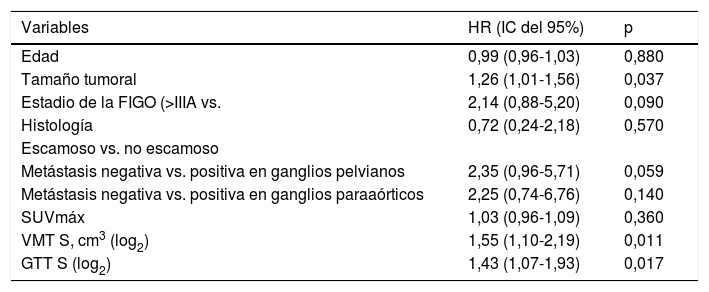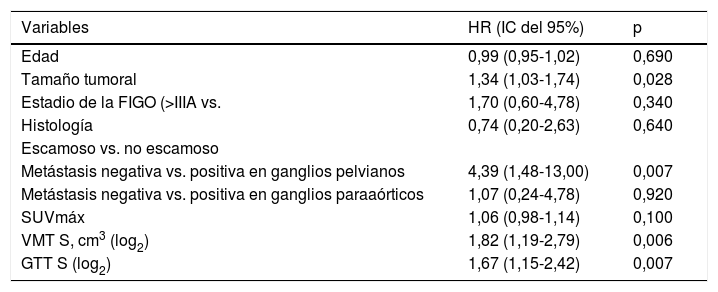La tomografía por emisión de positrones con 18-flúor-2-desoxi-D-glucosa (18F-FDG PET/TC) es considerada el método de imagen más preciso para la detección de las metástasis ganglionares o a distancia en el cáncer cervical. El volumen metabólico tumoral (VMT) y la glucólisis tumoral total (GTT) de 18F-FDG PET/TC constituyen mediciones volumétricas de las células tumorales, con captación incrementada de 18F-FDG. Se evaluó el valor pronóstico de VMT y GTT en pacientes con cáncer cervical avanzado (CCA).
MétodosA 38 pacientes con CCA de un hospital universitario terciario se les realizó 18F-FDG PET/TC entre junio de 2009 y diciembre de 2015.
Se analizaron diversos factores clínico-patológicos y parámetros de PET, para evaluar su relación con la supervivencia libre de progresión (SLP) y la supervivencia global (SG). Dichos parámetros fueron: valor estandarizado de captación máximo (SUVmáx), valor estandarizado de captación medio (SUVmedio), VMT y GTT del tumor primario, los ganglios pélvicos, los ganglios paraaórticos y el volumen metabólico metastásico, de existir.
ResultadosUn total de 38 pacientes con CCA cumplieron los criterios de inclusión. A todos ellos se les realizó 18F-FDG PET/TC con anterioridad a la quimiorradioterapia definitiva. En los análisis univariantes el tamaño tumoral mayor, las metástasis de los ganglios pélvicos, el VMT y la GTT reflejaron una asociación significativa con la SLP y la SG (el VMT HR=1,55, p=0,011 y la GTT HR=1,43, p=0,017 para la SLP; y el VMT HR=1,82, p=0,006 y la GTT HR=1,67, p=0,007 para la SG).
ConclusiónLa suma de GTT y la suma de VMT pretratamiento parecen ser un factor pronóstico independiente para la SG y la SLP en pacientes con CCA tratados mediante quimiorradioterapia definitiva, y reflejan una medición mejor que la clásica de SUVmáx.
18-Fluoro-2-deoxy-d-glucose positron emission tomography (18F-FDG PET/CT) is considered to be the most accurate image method of detection of node or distant metastases in cervical cancer. Metabolic tumor volume (MTV) and total lesion glycolysis (TLG) of 18F-FDG PET/CT are volumetric measurements of tumor cells with increased 18F-FDG uptake. The prognostic value of MTV and TLG in patients with advanced cervical cancer (ACC) were evaluated.
Methods38 patients with ACC from one tertiary university hospital underwent 18F-FDG PET/CT between June 2009 and December 2015.
Clinicopathologic factors and various PET parameters were analyzed to evaluate their relationship with recurrence-free survival (RFS) and overall survival (OS). These parameters were: maximum standardized uptake value (SUVmax), mean standardized uptake value (SUV mean), metabolic tumor volume (MTV), and total lesion glycolysis (TLG) of the primary tumor, of the pelvic nodes, of the paraaortic nodes and the metabolic volume of the metastases if any.
ResultsA total of 38 patients with ACC fulfilled the inclusion criteria. All of them underwent a 18F-FDG PET/CT before definitive chemoradiotherapy. In the univariate analyses higher tumor size, pelvic lymph node metastasis and both MTV and TLG showed a significant association with OS and with RFS (MTV HR=1.55, p=0.011 and TLG HR=1.43, p=0.017 for RFS and MTV HR=1.82, p=0.006 and TLG HR=1.67, p=0.007 for OS).
ConclusionPretreatment TLG sum and MTV sum seem to be independent prognostic factors for OS and RFS in patients with advanced cervical cancer treated with definitive chemoradiotherapy and they are better than the classic measurement of SUVmax.
Article

Revista Española de Medicina Nuclear e Imagen Molecular (English Edition)











